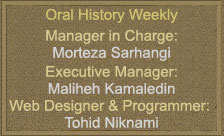| No. 410 | 27 August 2019 |
Suggestions for Conducting Oral HistoryThe Art of the Oral HistoriansThe following text is a translation and summary of David Russell writing "The Art of the Oral Historians". He is author of "Quiet Revolutionary: An Oral History". This transcript which is extracted from UC Santa Barbara Library Website is a practical workshop and his suggestions for doing oral history work. The following text is a translation of a part which is before this interview.Rainy Travel Log (VIII)It is time to go flooded area named Hamidiyeh. We get ready to move with one of comrades who came from Imam Mahdi Theological Seminary and was familiar with ways. Along the way, there is still talk and words about the area, and different dialogues: Obviously, there were sugar cane on the sidelines of Karun River in the past. Were not there?Most Oral History Projects of the Prisoners of War Transformed into Oral MemoryIranian Oral History Site - The hard days of loneliness, exhaustion, torture, waiting, longing for family and endless captivity finally ended on August 17, 1990, and more than 43,000 of the prisoners were gradually returned to Iran. Production of films about the era of captivity in Saddam military camps began with the narration of the released captives and the production of their memoir books. Payam Azadegan Artistic Cultural Institute ...The 304th Night of Memory-4An Operation Which Was Not Like Other OperationsAccording to Iranian Oral History Website, the 304th Memory Night of Holy Defense was held in Sooreh Hall of Hozeh Honari in the evening Thursday, July 25, 2019. In the session, Bakhshali Alizadeh, Ibrahim Khodabandeh, and Mohammad Hashem Mosaheb narrated memories about Peoples Mojahedin Organization of Iran (Monafeqin) and Operation Mersad. In the first and second parts of this report, you read memories of Bakhshali Alizadeh and Ibrahim Khodabandeh. Oral History Weekly Magazine Aims and Regulations
Oral History Weekly Magazine wishes to create a suitable place for thoughts and idea development; Its main field would be “Oral History” and subjects as telling & writing memoirs, writing diaries, travelogues, chronologies, and all other subfields of history which are presented in the form of news, articles, reports, notes, interviews and memoirs can be included. There is no limitation on the length of would-be-sent materials. Mentioning the name, academic background and email is necessary. Articles with complete references and bibliography are more credited and an abstract would quite helpful. Weekly is not about to publish any material consisting insults and libels about other people or anything that brings anxiety to public opinion. Weekly can edit and translate the received materials. The published articles and materials are only the writer’s ideas and Oral History Weekly Magazine has no responsibility about their content. |
 Thirsty Sands (Part 8) Jafar Rabiei Design: Ali Vaziri First published in 1991 Publishing House, Islamic Propagation Organization Printed at the Aryan
A T.V. that was at the end of the hall just then began to play the Al-Amarah song. The Iraq is called one another to listen to this song. Even those who were outside the hall ran enthusiastically towards the T.V.. Apparently this anthem had special value for them, and the timing of its broadcast was not unrelated to the attack of our forces on the city of Al-Amarah.    |
